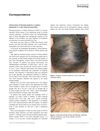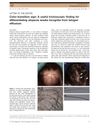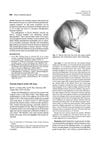 17 citations,
October 2017 in “Journal of Cutaneous Medicine and Surgery”
17 citations,
October 2017 in “Journal of Cutaneous Medicine and Surgery” No treatment has been proven to effectively stop hair loss or regrow hair in Frontal Fibrosing Alopecia, and more research is needed.
 16 citations,
January 2017 in “Acta dermatovenerologica Alpina, Pannonica et Adriatica (Tiskana izd.)”
16 citations,
January 2017 in “Acta dermatovenerologica Alpina, Pannonica et Adriatica (Tiskana izd.)” A patient with complete hair loss regrew all her hair using tofacitinib.
 13 citations,
January 2018 in “International Journal of Dermatology”
13 citations,
January 2018 in “International Journal of Dermatology” The study found that treatment improved hair condition in patients with Fibrosing Alopecia in a Pattern Distribution in Chile.
 12 citations,
October 2016 in “Anais Brasileiros de Dermatologia”
12 citations,
October 2016 in “Anais Brasileiros de Dermatologia” Frontal Fibrosing Alopecia may be linked to autoimmune diseases like Sjögren's syndrome.
 11 citations,
January 2012 in “International Journal of Trichology”
11 citations,
January 2012 in “International Journal of Trichology” Caffeine may help hair growth in hereditary hair loss.
 7 citations,
May 2017 in “Journal of The American Academy of Dermatology”
7 citations,
May 2017 in “Journal of The American Academy of Dermatology” Camouflaging agents like hair fibers and wigs significantly improve appearance and self-esteem for most hair loss patients.
 2 citations,
March 2018 in “The Journal of Dermatology”
2 citations,
March 2018 in “The Journal of Dermatology” The "color-transition sign" helps tell apart alopecia areata incognita from telogen effluvium by looking at hair color changes.
 July 2018 in “Elsevier eBooks”
July 2018 in “Elsevier eBooks” Frontal Fibrosing Alopecia is a type of hair loss affecting mostly older women, with no agreed best treatment.
 180 citations,
November 1991 in “American Journal of Psychiatry”
180 citations,
November 1991 in “American Journal of Psychiatry” Fluoxetine was not effective in treating hair-pulling disorder in the short term.
 126 citations,
April 2006 in “International Journal of Dermatology”
126 citations,
April 2006 in “International Journal of Dermatology” The conclusion is that FFA and LPP have similar scalp biopsy features, making them hard to distinguish histologically, and FFA may be a specific kind of scarring hair loss.
 60 citations,
January 2007 in “Human Genetics”
60 citations,
January 2007 in “Human Genetics” AR polyglycine repeat doesn't cause baldness.
 41 citations,
July 2017 in “Journal of The American Academy of Dermatology”
41 citations,
July 2017 in “Journal of The American Academy of Dermatology” Men with Frontal fibrosing alopecia typically lose hair on the front scalp and sometimes on sideburns and upper lip, with treatments showing varied success.
 37 citations,
May 2016 in “JAAD case reports”
37 citations,
May 2016 in “JAAD case reports” Oral minoxidil shows promise in treating monilethrix-related hair loss.
 33 citations,
August 1985 in “Archives of Dermatology”
33 citations,
August 1985 in “Archives of Dermatology” Acquired Progressive Kinking of Hair is likely an early sign of male pattern baldness.
 24 citations,
January 2000 in “Dermatology”
24 citations,
January 2000 in “Dermatology” Gene linked to common hair loss found, may lead to new treatments.
 20 citations,
January 2016 in “Intractable & Rare Diseases Research”
20 citations,
January 2016 in “Intractable & Rare Diseases Research” Combination therapy, especially with finasteride, is effective for treating frontal fibrosing alopecia.
 16 citations,
March 2011 in “Dermatologic Therapy”
16 citations,
March 2011 in “Dermatologic Therapy” Women with greater androgen sensitivity respond better to finasteride for hair loss.
 15 citations,
January 1987 in “Electrophoresis”
15 citations,
January 1987 in “Electrophoresis” Human head hair proteins can be typed into eight distinct patterns, useful for genetic and forensic investigations.
 14 citations,
August 2012 in “Clinics in Dermatology”
14 citations,
August 2012 in “Clinics in Dermatology” In the Middle Ages, European noblewomen intentionally removed forehead hair to be fashionable, showing how beauty standards can affect the perception of hair loss.
 14 citations,
January 2006 in “Australasian journal of dermatology”
14 citations,
January 2006 in “Australasian journal of dermatology” Alopecia areata can look like frontal fibrosing alopecia, making diagnosis hard.
 12 citations,
January 2015 in “Indian Journal of Dermatology, Venereology and Leprology”
12 citations,
January 2015 in “Indian Journal of Dermatology, Venereology and Leprology” A mother and daughter with similar hair loss conditions and identical HLA types suggest a genetic link between the conditions.
 9 citations,
September 2016 in “Dermatologic Surgery”
9 citations,
September 2016 in “Dermatologic Surgery” New LPP subtype affects vellus hairs, mimics AGA, and needs biopsy for diagnosis.
 8 citations,
December 2020 in “Scientific reports”
8 citations,
December 2020 in “Scientific reports” Selective breeding caused the unique curly hair in Mangalitza pigs.
 8 citations,
November 2015 in “The American journal of dermatopathology/American journal of dermatopathology”
8 citations,
November 2015 in “The American journal of dermatopathology/American journal of dermatopathology” Punctate follicular porokeratosis is a skin condition with specific features seen in hair follicles.
 8 citations,
August 2009 in “Pediatric transplantation”
8 citations,
August 2009 in “Pediatric transplantation” A five-month-old boy with Omenn syndrome successfully recovered after a stem cell transplant with reduced intensity conditioning.
 8 citations,
October 1989 in “Journal of the American Academy of Dermatology”
8 citations,
October 1989 in “Journal of the American Academy of Dermatology” A 5-year-old boy's seasonal hair loss is linked to his allergies.
 8 citations,
May 1941 in “Science”
8 citations,
May 1941 in “Science” Mouse embryos can develop in chick embryos, but they grow smaller with some organ issues.
 8 citations,
May 1941 in “Science”
8 citations,
May 1941 in “Science” Inositol helped cure hair loss around rats' eyes and improved their growth.

Low-dose oral isotretinoin improved hair loss and facial bumps in patients with a specific type of hair loss.
 6 citations,
January 2020 in “The journal of investigative dermatology/Journal of investigative dermatology”
6 citations,
January 2020 in “The journal of investigative dermatology/Journal of investigative dermatology” New topical treatment using spherical nucleic acids shows promise in reducing psoriasis inflammation.






























